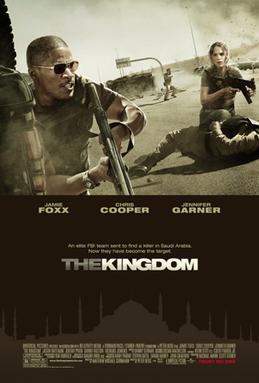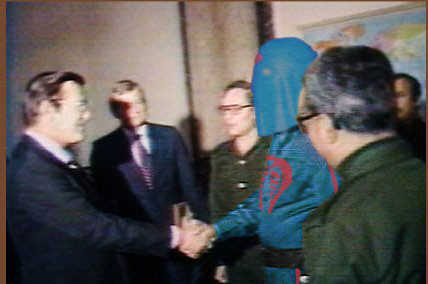I apologize for not picking up on this sooner. Iranian President Mahmoud Ahmadinejad's visit to Columbia University on Monday eclipsed most American coverage of President Bush's speech at the United Nations General Assembly the following day:
This great institution must work for great purposes -- to free people from tyranny and violence, hunger and disease, illiteracy and ignorance, and poverty and despair. Every member of the United Nations must join in this mission of liberation.
First, the mission of the United Nations requires liberating people from tyranny and violence. The first article of the Universal Declaration begins, "All human beings are born free and equal in dignity and rights." The truth is denied by terrorists and extremists who kill the innocent with the aim of imposing their hateful vision on humanity. The followers of this violent ideology are a threat to civilized people everywhere. All civilized nations must work together to stop them -- by sharing intelligence about their networks, and choking their -- off their finances, and bringing to justice their operatives.

In the long run, the best way to defeat extremists is to defeat their dark ideology with a more hopeful vision -- the vision of liberty that founded this body. The United States salutes the nations that have recently taken strides toward liberty -- including Ukraine and Georgia and Kyrgyzstan and Mauritania and Liberia, Sierra Leone and Morocco. The Palestinian Territories have moderate leaders, mainstream leaders that are working to build free institutions that fight terror, and enforce the law, and respond to the needs of their people. The international community must support these leaders, so that we can advance the vision of two democratic states, Israel and Palestine, living side-by-side in peace and security.
Its too bad the Palestinian people tried to vote those Palestinian leaders out of office a few years ago. Its also too bad that U.S. is doing nothing to prevent Israel from declaring the Gaza Strip an 'enemy entity' and closing it off to everything but humanitarian aid. But I digress. The speech only gets better:
Brave citizens in Lebanon and Afghanistan and Iraq have made the choice for democracy -- yet the extremists have responded by targeting them for murder. This is not a show of strength -- it is evidence of fear. And the extremists are doing everything in their power to bring down these young democracies. The people of Lebanon and Afghanistan and Iraq have asked for our help. And every civilized nation has a responsibility to stand with them.
Every civilized nation also has a responsibility to stand up for the people suffering under dictatorship. In Belarus, North Korea, Syria, and Iran, brutal regimes deny their people the fundamental rights enshrined in the Universal Declaration. Americans are outraged by the situation in Burma, where a military junta has imposed a 19-year reign of fear. Basic freedoms of speech, assembly, and worship are severely restricted. Ethnic minorities are persecuted. Forced child labor, human trafficking, and rape are common. The regime is holding more than 1,000 political prisoners -- including Aung San Suu Kyi, whose party was elected overwhelmingly by the Burmese people in 1990.
The ruling junta remains unyielding, yet the people's desire for freedom is unmistakable. This morning, I'm announcing a series of steps to help bring peaceful change to Burma. The United States will tighten economic sanctions on the leaders of the regime and their financial backers. We will impose an expanded visa ban on those responsible for the most egregious violations of human rights, as well as their family members. We'll continue to support the efforts of humanitarian groups working to alleviate suffering in Burma. And I urge the United Nations and all nations to use their diplomatic and economic leverage to help the Burmese people reclaim their freedom.
In Cuba, the long rule of a cruel dictator is nearing its end. The Cuban people are ready for their freedom. And as that nation enters a period of transition, the United Nations must insist on free speech, free assembly, and ultimately, free and competitive elections.
In Zimbabwe, ordinary citizens suffer under a tyrannical regime. The government has cracked down on peaceful calls for reform, and forced millions to flee their homeland. The behavior of the Mugabe regime is an assault on its people -- and an affront to the principles of the Universal Declaration. The United Nations must insist on change in Harare -- and must insist for the freedom of the people of Zimbabwe.
In Sudan, innocent civilians are suffering repression -- and in the Darfur region, many are losing their lives to genocide. America has responded with tough sanctions against those responsible for the violence. We've provided more than $2 billion in humanitarian and peacekeeping aid. I look forward to attending a Security Council meeting that will focus on Darfur, chaired by the French President. I appreciate France's leadership in helping to stabilize Sudan's neighbors. And the United Nations must answer this challenge to conscience, and live up to its promise to promptly deploy peacekeeping forces to Darfur.
Maybe these words would mean more if they were spoken before we opened an extra-judicial prison camp in Guantanamo Bay. Or before we established secret prisons. Or before the abuses at Abu Ghraib happened. Or before we started torturing people. Or before we enlisted other states to torture on our behalf.
Setting aside the matter of whether all of the above had to happen in order to 'save lives,' does President Bush realize that making speeches like this only hurt America's image abroad? I'll be the first cop to hypocrisy in U.S. foreign policy. It is a dirty business full of questions with no right answers.
But must President Bush use such self-righteous and indignant language in front of the whole world when he knows that is the U.S. is adding more 'War on Terror' skeletons to its closet every day? Why didn't he just talk about poverty or women's rights or some other issue that the U.S. is not actively disrupting. Heck, talk about global warming for all I care.
Just stop embarrassing the country with this hollow talk of freedom. It doesn't fool anyone.













